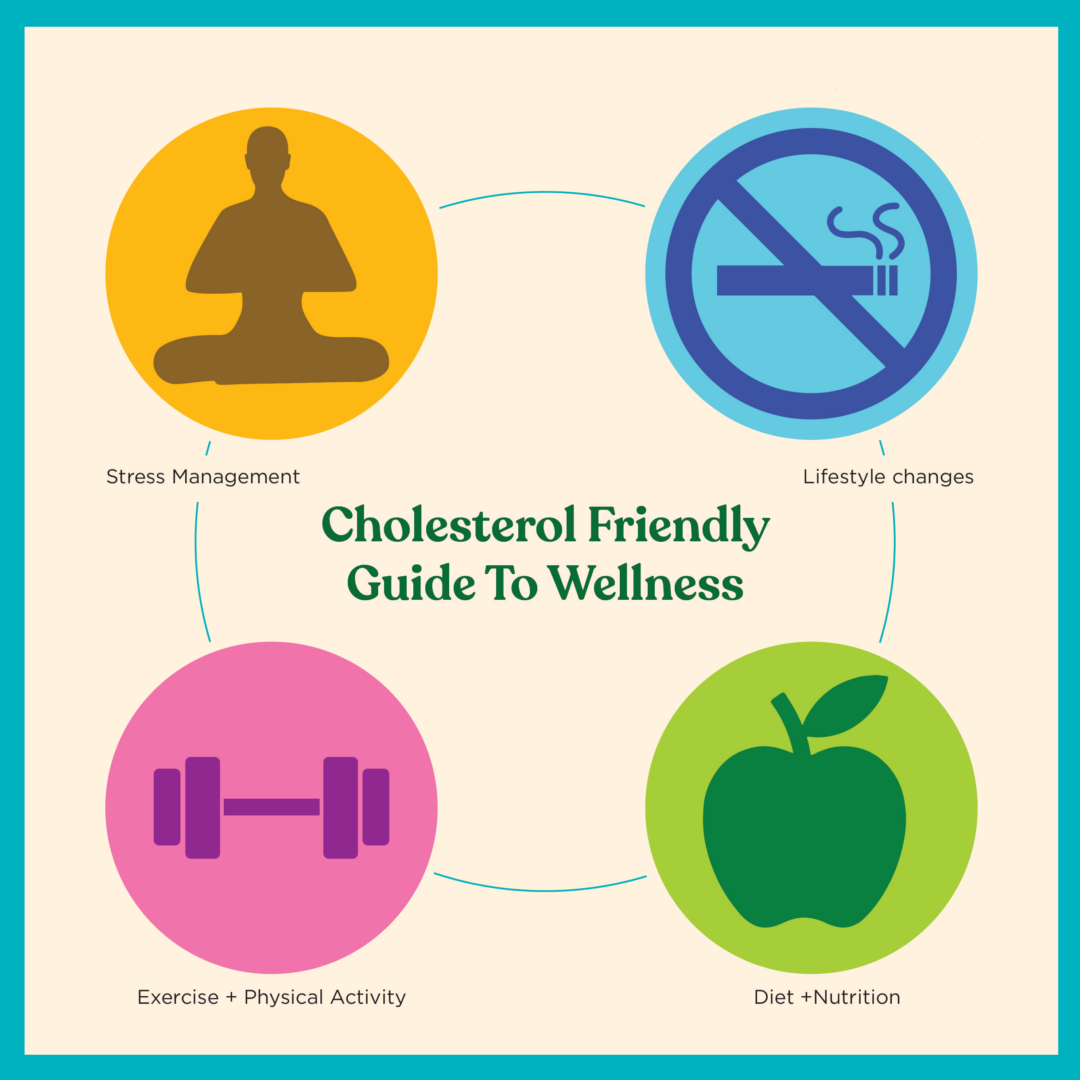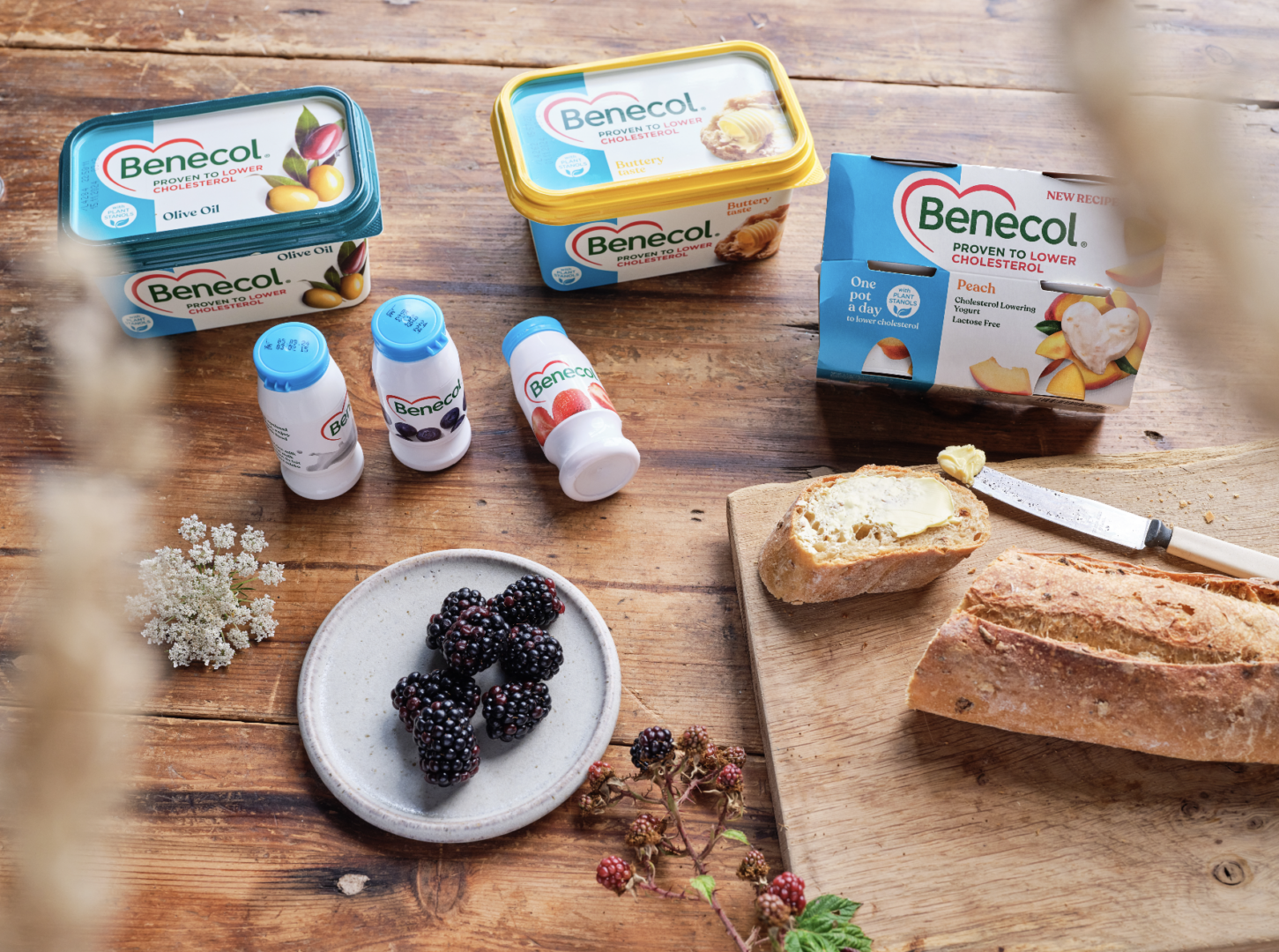Cholesterol Friendly Guide To Wellness
Caring for your heart goes beyond just keeping track of cholesterol —it's about embracing a healthier, more balanced way of life. At Benecol, we’re all about a comprehensive approach to wellness that nurtures both the body and mind through smart nutrition, regular exercise, stress relief, and mindful lifestyle choices. Join us as we share practical tips and expert advice to help you build a cholesterol-friendly routine that supports your heart and enriches your daily life!

Diet and Nutrition: Building a Heart-Healthy Plate
A well-balanced diet is the cornerstone of good health and well-being, especially when managing cholesterol levels. It’s not just about avoiding certain foods but embracing nutrient-rich options that support heart health.
- Focus on Fibre: Soluble fibre found in oats, beans, fruits, and vegetables is key to maintaining overall health. According to the Irish Heart Foundation, eating a fibre-rich diet is associated with a lower risk of heart disease. Additionally, choosing foods with fibre also makes us feel fuller and help digestion.
- Healthy Fats are Key: Swap out saturated fats found in butter, red meat, and processed foods for heart-healthy fats like those in avocados, olive oil, and nuts. These healthier fats can help lower cholesterol levels.
- Plant Stanols: Foods enriched with plant stanols, like Benecol products, can help block cholesterol absorption in the gut, effectively lowering cholesterol levels.

Exercise and Physical Activity: Moving Towards Better Heart Health
Regular physical activity is a game-changer for cholesterol management. It not only helps lower LDL cholesterol, it also improves overall cardiovascular fitness. Here are some heart-centred wellness tips for incorporating exercise into your daily routine:
- Aerobic Exercises: Activities like brisk walking, jogging, swimming, and cycling are excellent for getting the heart pumping and improving circulation. Aim for at least 150 minutes of moderate-intensity aerobic exercise each week.
- Strength Training: Don’t overlook the benefits of resistance exercises such as weight lifting, yoga, or Pilates. Strength training helps build muscle mass, which can boost metabolism and support weight management—a critical factor in maintaining healthy cholesterol levels.
- At-Home Workouts: No gym? No problem! There are plenty of effective workouts you can do right from your living room. From bodyweight exercises to guided online aerobic classes, staying active at home has never been easier.
Read More: Cholesterol friendly guide to Aerobics
Stress Management: Keeping Calm for a Healthy Heart
Chronic stress can negatively affect cholesterol levels and overall heart health. When stressed, the body releases cortisol, a hormone that can increase blood cholesterol, triglycerides, and blood pressure. Learning how to manage stress is essential for maintaining heart-centred wellness.
- Mindfulness and Meditation: Practices like mindfulness meditation, deep breathing exercises, and yoga can help lower stress levels and promote relaxation. Even just 10 minutes a day of focused breathing or meditation can make a significant difference.
- Physical Activity: Physical activity isn’t just good for the body; it’s great for the mind too! Regular exercise has been shown to reduce anxiety and improve mood, creating a positive feedback loop for both mental and physical health.
- Quality Sleep: Ensure you’re getting enough restful sleep, as poor sleep can contribute to stress and, consequently, poor heart health. Aim for 7-9 hours of quality sleep per night to allow your body to recover and rejuvenate.
For more inspiration on incorporating movement into your routine, read about Gabrielle’s Cholesterol Journey and discover how she found joy in staying active!

Photo by: Jo Murphy/Good as Gold for Benecol
Lifestyle Changes: Small Steps for Big Impact
Lifestyle changes don’t need to be drastic to be effective. Small, consistent changes can lead to significant improvements in cholesterol levels and overall wellness.
- Quit Smoking: Smoking cessation has immediate benefits for heart health. Within weeks of quitting, HDL cholesterol levels start to improve, and within months, circulation and lung function can significantly recover.
- Moderate Alcohol Intake: While moderate alcohol consumption may have some heart benefits, excessive drinking can raise cholesterol and blood pressure. Stick to recommended guidelines to keep your heart in check.
- Regular Cholesterol Checks: Keep an eye on your cholesterol levels with regular check-ups. This helps you track your progress and make necessary adjustments to your wellness plan.
Achieving and maintaining a cholesterol-friendly lifestyle is about more than just numbers—it’s about nurturing your body, mind, and spirit. By integrating a balanced diet, regular exercise, stress management techniques, and positive lifestyle changes, you can support your heart health and overall wellness. Remember, every small step you take today is a step towards a healthier tomorrow. Let’s embark on this wellness journey together!
